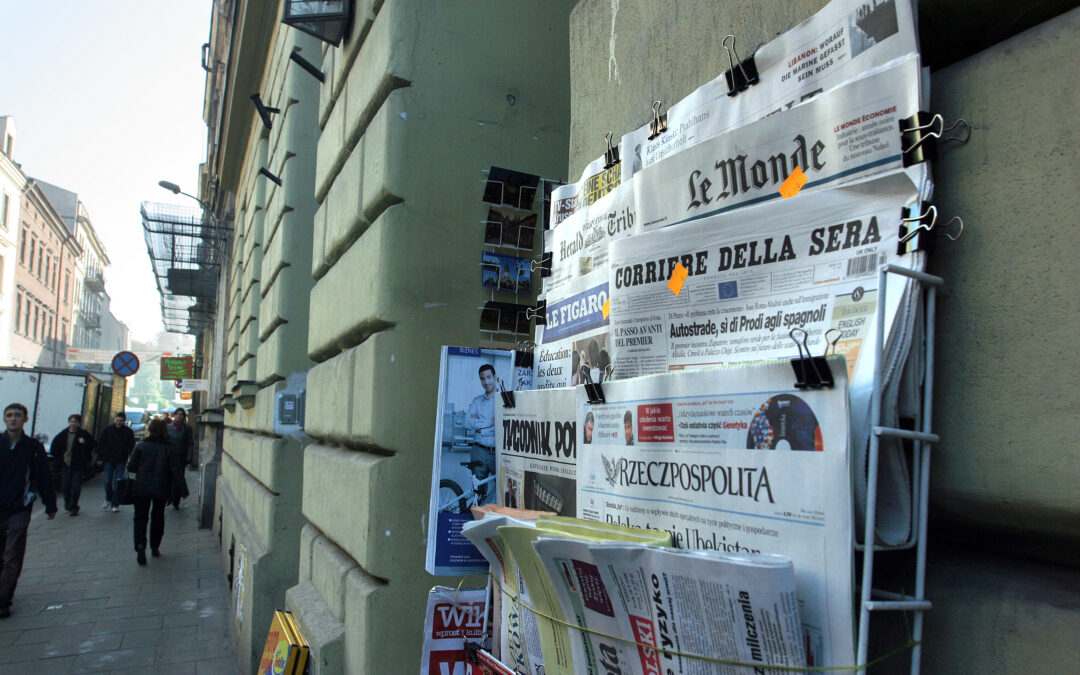An investment group backed by George Soros has finalised its purchase of a stake in a leading Polish publisher. It is the third recent media deal in Poland involving the Media Development Investment Fund (MDIF), which is supported by the Hungarian-American billionaire.
The deal has seen Amsterdam-based Pluralis BV buy 40% of Gremi Media for 97 million zloty (€21.4m). Gremi’s leading title is Rzeczpospolita, Poland’s second biggest non-tabloid daily. Among its other properties is Parkiet, a business and finance newspaper.
Pluralis was launched in November as a coalition of European media companies, foundations and investors with the aim of “supporting plurality of news across Europe”. It is controlled by a consortium of shareholders including the King Baudouin Foundation (28.46%), Mediahuis (25.39%) and the Soros Economic Development Fund (17.41%).
It is managed by MDIF, which also owns a 2.02% stake. MDIF, which is funded among others by Soros’s Open Society Foundations, has also invested in Poland’s Radio Zet and Agora. The latter owns Gazeta Wyborcza, Poland’s leading non-tabloid daily and a strong critic of the current national-conservative government.
The stake in Gremi Media, which was agreed in mid-December, is Pluralis’s second investment following the acquisition of a 34% share in Slovakia’s Petit Press. As well as Rzeczpospolita and Parkiet, Gremi also holds controlling interests in e-Kiosk, a service offering e-subscriptions to newspapers, and KancelarieRP, a network of law firms.
Gremi’s owner, KCI – which is controlled by two companies belonging to Polish businessman Grzegorz Hajdarowicz – said that it had found a “strong and reliable partner” in Pluralis. It added that the deal would bolster the “attractiveness of content” and allow customers “faster and easier” access to information through new technologies.
“The situation on the Polish media market is becoming more and more difficult,” Hajdarowicz told Rzeczpospolita in November when the news of the preliminary agreement for the acquisition was announced. “The pressure of politics is having an increasingly negative impact.”
Since the ruling Law and Justice (PiS) party came to power in 2015, Poland has fallen every year in the annual World Press Freedom Index, reaching its lowest ever position of 64th last year. The PiS government has sought to assert greater control over the media and, say critics, to silence critical voices.
It had previously been rumoured that Poland’s state-owned oil giant Orlen was in advanced talks to take over Gremi Media. Orlen recently acquired another publisher, Polska Press, which owns hundreds of local newspapers and websites, in a move hailed by the government but which raised further concern over media freedom.
Hajdarowicz has himself been accused of enjoying close relations with the main opposition party, Civic Platform (PO), and of forcing conservative voices out of Rzeczpospolita after his takeover of the newspaper in 2011.
Z cyklu WAŻNE ARCHIWA @Tygodnik_Sieci na @wPolityce_pl : Zamach na „wolne media”?! PRZYPOMINAMY jak Platforma Obywatelska pacyfikowała konserwatywne redakcje https://t.co/Rimzunymdc
— Marcin Wikło 🇵🇱 (@marcin_wiklo) July 17, 2021
Hajdarowicz has repeatedly underlined that Pluralis is keen for KCI to keep its controlling stake in Gremi Media and for the current management and editors to remain in place.
“Rzeczpospolita and Parkiet remain outside the main dividing lines of Polish political life,” he wrote in a statement. “But they have a clear compass of values: defending the free market, protecting private property, respecting human and civil rights as understood by Western Europe, supporting Polish membership in the EU and NATO.”
Allegations of links to Soros have occasionally been used in Poland as a line of attack by the ruling party and its supportive media against the opposition.
During the 2020 presidential election campaign, news broadcasts on state TV presented the main opposition candidate, Rafał Trzaskowski, as working on behalf of a “powerful foreign lobby” linked to Soros and of seeking to “fulfil Jewish demands”.
Main image credit: WALDEK SOSNOWSKI / AGENCJA GAZETA

Maria Wilczek is deputy editor of Notes from Poland. She is a regular writer for The Times, The Economist and Al Jazeera English, and has also featured in Foreign Policy, Politico Europe, The Spectator and Gazeta Wyborcza.




















